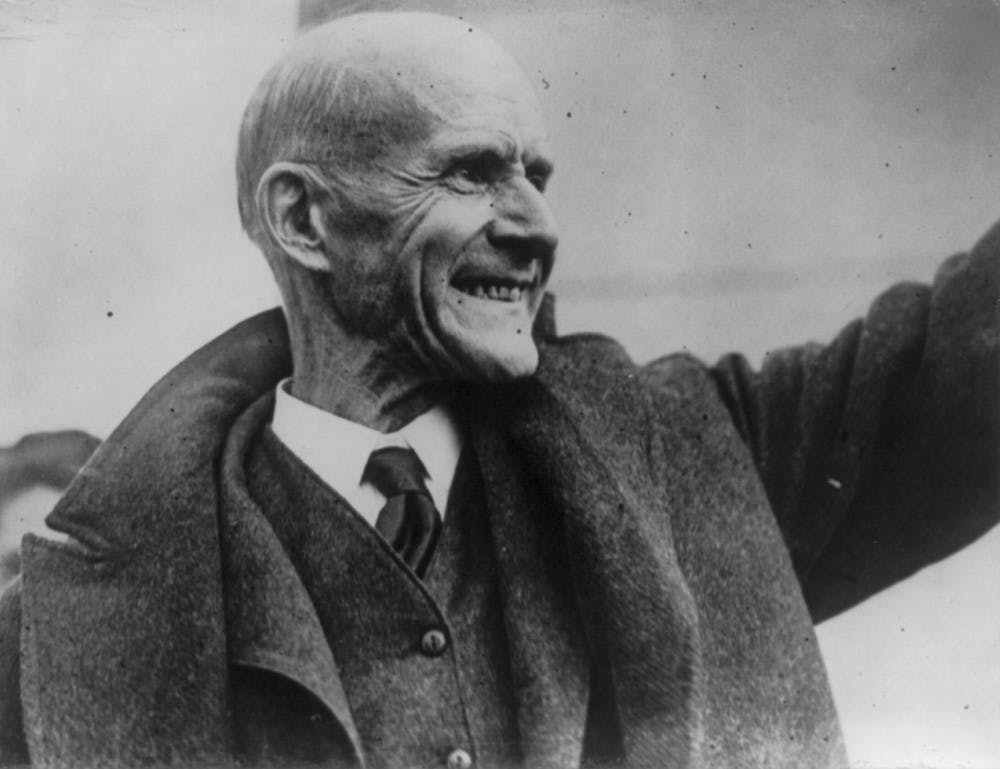Bernie Sanders ran a socialist campaign during this past election cycle, emphasizing issues like wealth and income inequality, especially concerning folks in the American middle class. Believe it or not, he is not the first ever presidential candidate to run on a socialist platform. You wouldn’t really know about it, though, if you were brought up in the American education system.
The story of Eugene V. Debs, a five-time candidate for the executive office, seemed to have skipped the history books for some reason or another. Was it because Debs was jailed by the U.S. government for sedition because he opposed World War I? Or was it due to his radical stance as a third-party candidate, that his oddball, left-wing views vanished in the haze of history?
Since you probably weren’t taught much about Eugene V. Debs in grade school, imagine his early political days not too far from here, in Terre Haute, Indiana, where a young Debs humbly finds his roots. In 1879, Debs was elected as the City Clerk as a Democrat, his first dabble in local politics in a fairly rural and down-to-earth Midwest city, where working class votes are absolutely essential. Considering this was before the Meat Inspection Act of 1907, largely inspired by Upton Sinclair’s socialist novel The Jungle, simple ideas such as worker’s rights and industrial regulatory measures were not in place. The start of his career in a local capacity would influence him as he continued to fight for working people.
Picture this Eugene Debs, a high-school dropout, but very polished individual who is outspokenly a student of Karl Marx. His future in politics is ahead of him, as he held high-ranking positions at a local union and even served as editor of its magazine. Very soon, he would form the American Railway Union in 1892, which became the largest organized union in the United States not long after its inception.
Then in the spring of 1894, a railroad workers union strike took place in a Chicago neighborhood named Pullman, after the industrialist George Pullman. The strike was led by the American Railway Union against President Grover Cleveland and the Pullman company, which was George Pullman’s railroad manufacturing business in the late 1800s.
It would be one of the most defining fights of Eugene Debs during his tenure as a labor organizer. The story goes that the Pullman Company fired 5,000 employees when workers did not accept the conditions of a wage cut. Using the power of his union and his ability to spread information, Debs ordered members of the American Railway Union to stop operating trains that held Pullman’s cars.
The strike would grow in numbers, and soon it became the largest worker’s strike in the history of the United States.
In July of 1894, Debs along with other leaders in the American Railroad Union were jailed for their connection to the Pullman strike. Debs was ordered to finish his sentence in Chicago, where his presence was welcomed by thousands of Chicagoans.
A few years into the future, Eugene Debs runs for president in 1900, and receives 96,000 votes in the general election as a Socialist. Then again, he declares his candidacy in 1904 and receives slightly more votes but still loses.
He would run in 1908, 1912 and 1920 for a total of five efforts for the highest executive office in the land.
His last candidacy for president should be made aware in American textbooks across the country. Debs was put into prison in April of 1919 for an infamous anti-war speech in Canton, Ohio. He was seen as a traitor by the U.S. government and was charged for espionage. He represented himself as defense attorney in the case.
In the speech, Eugene Debs proclaims,
In due time the hour will strike and this great cause triumphant—the greatest in history—will proclaim the emancipation of the working class and the brotherhood of all mankind."
While in prison, Debs ran for president in the 1920 election cycle. He won almost one-million votes conducting the campaign behind bars. In 1926, Eugene Debs died of heart failure in Elmhurt, IL. He was 70 years old, battered and torn from the harsh living conditions of prison.
Years have passed since the life of Eugene Victor Debs, including the election of another president with socialist appeal named Franklin Roosevelt. A decade in the future, Roosevelt pushed his set of policies to bring the United States out of the Great Depression nicknamed the New Deal which stemmed from the socialist ideas of Debs and his constituents.
Today, the story of Eugene Debs inspires politicians wanting to initiate democratic-socialist movements in the United States like Bernie Sanders who remarked in his 2016 book, Our Revolution,
The life of Eugene V. Debs, his vision of a world of peace, justice, democracy, and brotherhood, has always been an inspiration to me. I have a plaque of Debs on a wall in my Washington Senate office."
Resistance movements to the Trump administration should model the integrity and courage of the great American revolutionary and maybe the life of Eugene Debs would find a more impactful place in the American history books.





